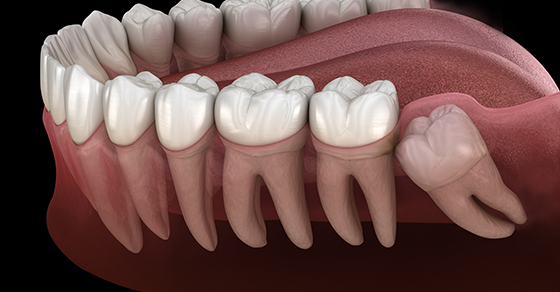Wisdom teeth, otherwise known as “third molars,” are the teeth that often erupt sometime between the ages of 17 and 25 (hence the word “wisdom” representing this transitional period from childhood to adulthood).
Many people with wisdom teeth are recommended by a professional at one point or another to have them surgically removed under dental sedation, especially if they’ve just recently begun to emerge. However, exactly why is that the case? Furthermore, is wisdom tooth removal always absolutely necessary?
In this article, we will answer these questions.
But first, let’s talk a little more about wisdom teeth, as well as several potential reasons why a dentist may recommend their patient arrange an extraction appointment for these (often troublesome) molars.
More About Wisdom Teeth
The wisdom teeth are the very last teeth to develop in a person’s mouth. For roughly a third of the population, however, they may not even develop at all. This portion of the population can certainly consider themselves lucky.
If a person’s wisdom teeth are deemed to be potentially problematic in the future, or if they’ve already begun to cause problems, the dentist will then urge that the patient have them surgically removed.
This surgical procedure should only ever be carried out by a trained and experienced professional and should be performed ideally before the patient turns 25 years of age to allow for a more smooth process. This is due to the fact that in younger patients, the roots of the wisdom teeth tend to be shorter and not as entrenched in the jaw.
Reasons Why Wisdom Tooth Removal May Be Necessary
1. The wisdom teeth are causing the patient pain
Feelings of pain and discomfort in the gums or jaw are unfortunately a common side effect of growing wisdom teeth. This pain may come on suddenly and increase over time as the wisdom teeth continue to come in, or may also occur when the person uses the back area of the mouth to chew or exert pressure.
In cases like these, it is generally recommended to have the third molars removed as soon as possible in order to eliminate the source of pain for the patient.
2. The wisdom teeth are “impacted” and there is no room for them in the person’s mouth
In many cases, a person’s wisdom teeth will remain essentially “trapped” in the jaw bone and gums, either entirely or partially. This is generally due to the fact that there is not adequate room or space available in the mouth to allow these teeth to fully erupt or to completely break through the gum surface at a proper angle.
Problems that commonly result from impacted wisdom teeth specifically include:
- Damage to the jaw or surrounding teeth
When there isn’t adequate room available for the wisdom teeth to come in properly, it can then result in damage to the jawbones. Ultimately, this will affect the motion of function of the mouth.
Moreover, the impacted wisdom teeth can shift other existing teeth in the mouth or even the jawline. This will lead to the overcrowding of teeth and development of bite issues, not to mention the possibility of severe pain when trying to open and close the jaw. - Difficulty cleaning the teeth, leading to tooth decay and gum infection
Impacted wisdom teeth will often make it more challenging for a person to effectively clean their mouth due to their unconventional positioning. Typically, these teeth come in at an angle, and because they are not fully erupted, the flap of gum surrounding the portion of the partially-erupted tooth becomes a high-risk area for trapping bacteria, which leads to infection.
Any erupted portion of the wisdom tooth or surrounding teeth in this area also become more susceptible to decay and cavity formation due to the increased difficulty in properly brushing and flossing these hard-to-reach areas.
3. The wisdom teeth present a risk for sinus issues
Wisdom teeth can actually affect the sinuses, as well, namely, in cases where the roots are positioned too close to the sinus area. This causes pressure that can lead to severe headaches or infection of the sinuses.
Fortunately, a wisdom tooth extraction procedure will help to alleviate this sinus pain and pressure, thus preventing any other associated issues from recurring, such as chronic tension headaches and pain in the jaw.
4. The wisdom teeth are already infected
If a person’s wisdom tooth has already become infected, then the dentist will generally suggest having it surgically extracted rather than keeping the tooth and treating it with a dental filling (especially if the infection has occurred within a partially erupted portion of tooth enamel). It’s wiser to pull the infected wisdom tooth, even if it is not impacted and has fully erupted, because the odds that it will become reinfected again in the future are quite high.
Additionally, wisdom teeth aren’t even necessary, so there’s no big loss suffered. Our third molars are just “bonus” teeth that we can certainly live without!
Have you been dealing with troublesome wisdom teeth?
Are you unsure of whether your third molars should be removed as a preventive measure? The good news is that at Downtown Sleep Dentistry, our Hamilton dentist and team are highly experienced in performing painless dental extractions that range from simple to complex—all in a safe, contemporary, and comforting dental environment.
Our facilities are equipped with only the latest and greatest in modern monitoring equipment, and our expert surgical team has extensive training in anesthesia and dental sedation techniques. Every patient that sets foot in our office can rest assured that they are receiving the highest standard of dental care we can provide.
Trust Downtown Sleep Dentistry for All of Your Wisdom Teeth Removal Needs
For more information about having your wisdom teeth removed, contact Downtown Sleep Dentistry & Oral Surgery at 289-272-8463 or book an appointment here. We look forward to hearing from you!


